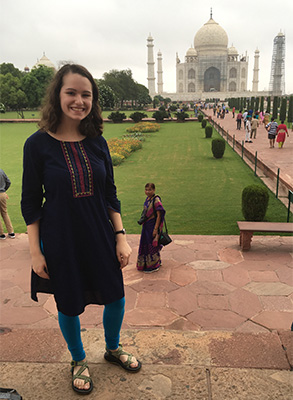Posted 8:06 a.m. Thursday, July 27, 2017
Student awarded prestigious U.S. government scholarship to learn critical world language.
Student awarded prestigious U.S. government scholarship to learn critical world language
UW-La Crosse student Madeline Dorman is practicing Urdu. The language most Americans have probably never heard of happens to be of particular importance to Dorman’s future — and the U.S. government. Dorman received the Critical Language Scholarship, a fully-funded summer overseas language and cultural immersion program for American undergraduate and graduate students. The program is part of the U.S. government’s effort to dramatically expand the number of Americans studying and mastering critical foreign languages. “Critical” languages are those less commonly taught in U.S. schools, but are essential for America’s engagement with the world, according to the U.S. Department of State. The scholarship program aims to prepare U.S. students for the 21st century globalized workforce, increase American competitiveness, and contribute to national security. [caption id="attachment_49398" align="alignleft" width="293"] Madeline Dorman has had some opportunities to sightsee while in India. She visited the Taj Mahal and Fatehpur Sikri, a small city in northern India built in the 16th century, pictured above.[/caption]
Dorman says Urdu is a dominant language in areas of the world with high population growth such as India and Pakistan. With many U.S. based companies outsourcing jobs to India, it is critical for young people to learn the language, she says. Her goal is to one day hold a leadership role within a U.S. company that has close ties with India and Pakistan.
“These companies are in need of leaders who have control over a target language to successfully achieve the set goals and standards,” she explains. “Additionally, these leaders need to be aware of cultural differences, such as holidays, traditions and ideas that could create conflicts that could've been avoided just by being aware.”
Dorman is first recipient from UWL
Madeline Dorman is one of approximately 550 American students at U.S. colleges and universities who received a Critical Language Scholarship award in 2017. About 5,000 students typically apply each year. Dorman is the first UWL student to receive the scholarship.
Q&A: Learning Urdu
Q: What three words would you use to describe learning Urdu?
A: Challenging, rewarding and amusing.
Q: Why did you pick these words?
A: Wrestling with the challenging aspects of Urdu are very rewarding when the effort (finally) enables me to communicate an idea in Urdu that I would've otherwise communicated with a point and/or a grunt (in order to adhere to the strict no-English language policy). It was initially very challenging for me to listen to people have entire conversations in Urdu while I could only recognize a few words here and there. That, along with the culture shock I experienced within the first week, was an eye opener for me. In India I am gaining so much more than just a language. I am gaining humility through my inability, along with a greater appreciation for my life at home through the challenges I face here, and knowledge of a place that is so rich in culture and history. There occasionally is humor through the challenges. Being able to laugh at language errors that translate to something ridiculous or confusing can often alleviate the stress of such a high pressure, high energy environment.
Q:What’s your favorite word or phrase so far in Urdu and what does it mean?
A:
Madeline Dorman has had some opportunities to sightsee while in India. She visited the Taj Mahal and Fatehpur Sikri, a small city in northern India built in the 16th century, pictured above.[/caption]
Dorman says Urdu is a dominant language in areas of the world with high population growth such as India and Pakistan. With many U.S. based companies outsourcing jobs to India, it is critical for young people to learn the language, she says. Her goal is to one day hold a leadership role within a U.S. company that has close ties with India and Pakistan.
“These companies are in need of leaders who have control over a target language to successfully achieve the set goals and standards,” she explains. “Additionally, these leaders need to be aware of cultural differences, such as holidays, traditions and ideas that could create conflicts that could've been avoided just by being aware.”
Dorman is first recipient from UWL
Madeline Dorman is one of approximately 550 American students at U.S. colleges and universities who received a Critical Language Scholarship award in 2017. About 5,000 students typically apply each year. Dorman is the first UWL student to receive the scholarship.
Q&A: Learning Urdu
Q: What three words would you use to describe learning Urdu?
A: Challenging, rewarding and amusing.
Q: Why did you pick these words?
A: Wrestling with the challenging aspects of Urdu are very rewarding when the effort (finally) enables me to communicate an idea in Urdu that I would've otherwise communicated with a point and/or a grunt (in order to adhere to the strict no-English language policy). It was initially very challenging for me to listen to people have entire conversations in Urdu while I could only recognize a few words here and there. That, along with the culture shock I experienced within the first week, was an eye opener for me. In India I am gaining so much more than just a language. I am gaining humility through my inability, along with a greater appreciation for my life at home through the challenges I face here, and knowledge of a place that is so rich in culture and history. There occasionally is humor through the challenges. Being able to laugh at language errors that translate to something ridiculous or confusing can often alleviate the stress of such a high pressure, high energy environment.
Q:What’s your favorite word or phrase so far in Urdu and what does it mean?
A:
